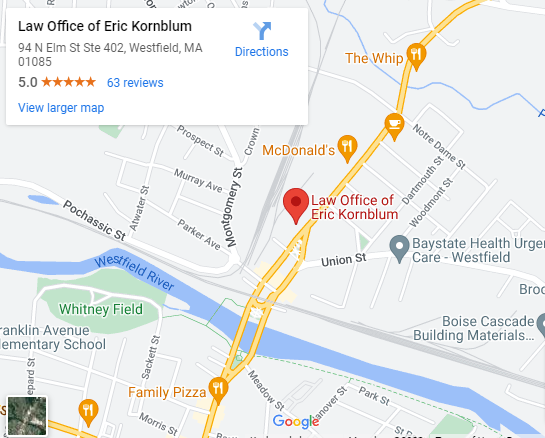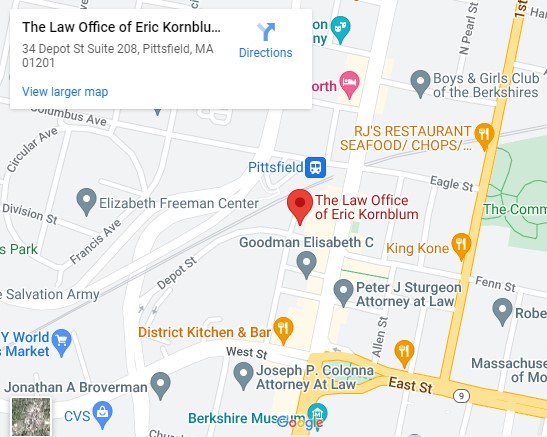Decoding Bankruptcy Claims With Great Insights
In the complex world of bankruptcy, understanding the terminology and legal nuances can be overwhelming. If you’ve found yourself asking, “When is a bankruptcy claim contingent, unliquidated, or disputed?” you’re not alone. These terms might sound like jargon, but they carry significant weight in the bankruptcy process. In this article, we’ll break down these terms in plain language, helping you grasp their meaning and importance. While this information is valuable, it’s crucial to recognize that the guidance of an experienced law firm, such as the Law Office of Eric Kornblum in Westfield, MA, can be indispensable in navigating the intricacies of bankruptcy claims.
If you’re facing bankruptcy challenges in Westfield, MA, our bankruptcy attorneys at the Law Office of Eric Kornblum are here to help. Contact us today to schedule a conversation, and let’s take the first step together towards resolving your financial concerns.
What is a Bankruptcy Claim?
A bankruptcy claim is a formal demand for payment from a creditor against a debtor who has declared bankruptcy. At its core, it represents the creditor’s assertion that the debtor owes a specific amount. When facing insurmountable financial hurdles, individuals or businesses may file for bankruptcy to gain relief from these pressing debts. As the process unfolds, creditors are grouped according to the type and nature of their claims.
As a critical step in the bankruptcy process, the “341 meeting of creditors” is convened. During this meeting, creditors have an opportunity to ask the debtor about their financial circumstances and the specifics of their claim. It serves as a forum for both parties to clarify the nature and extent of the debts in question.
The bankruptcy claim itself delineates the precise amount a debtor owes to a creditor. Such claims can encompass diverse debts – from outstanding loans and credit card dues to unpaid medical bills and other unsettled financial commitments. Armed with these claims, creditors stake their claim on a portion of the debtor’s assets. These assets are then either liquidated or reorganized to ensure debt repayment.
How Many Different Bankruptcy Claims are There?
Bankruptcy claims can take various forms: contingent, unliquidated, or disputed. Understanding these claims is vital for both debtors and creditors, as it dictates how debts are prioritized and repaid within the bankruptcy process. It’s a complex landscape that demands sound legal guidance.
Contingent Claim
A contingent claim in bankruptcy is a unique kind of debt. Instead of being a straightforward obligation where the debtor owes a specific amount right now, a contingent claim hinges on a future event. Essentially, it’s a “what-if” claim. The debtor isn’t immediately liable to pay unless a particular circumstance or condition takes place.
Imagine you’ve co-signed a loan with a friend. You’re only responsible for repaying the loan if your friend defaults on their payments. Until that happens, you don’t owe anything. In this scenario, your responsibility to the bank is contingent upon your friend’s potential default.
It’s crucial to handle contingent claims correctly in bankruptcy proceedings. Misunderstanding or mishandling these can have repercussions for both debtors and creditors. Always consult with experienced legal professionals, like our team at the Law Office of Eric Kornblum, when navigating these complexities. Give our law firm a call now to schedule a conversation.
Unliquidated Claim
An unliquidated claim might sound complicated, but it revolves around a simple concept: uncertainty in the amount owed. In bankruptcy terms, when a debt’s exact value isn’t immediately clear or determined, it’s referred to as unliquidated.
Think of it like a pending medical bill where the services have been rendered, but the final amount hasn’t been calculated yet. You know you owe the hospital money, but neither you nor the hospital knows the exact figure until all services, tests, and treatments are tabulated.
Handling unliquidated claims can be a delicate process in bankruptcy. These claims require careful assessment and sometimes negotiation to arrive at an agreed amount. It’s essential to approach such claims with precision and understanding, ensuring that both parties – the debtor and creditor – reach a fair resolution. For those in Westfield, MA, seeking guidance on this, our legal team is always here to help clarify and streamline the process. Call us now to schedule a conversation with our bankruptcy attorney.
Disputed Claim
At the heart of a disputed claim lies disagreement. In the realm of bankruptcy, a disputed claim arises when there’s contention between the debtor and the creditor about either the validity of the debt itself or the amount claimed to be owed.
Picture it this way: You receive a bill for home repairs you believe were never completed to satisfaction, or perhaps you’re billed for services you never received at all. You’d dispute the bill, challenging either the whole claim or just a portion of it.
Navigating a disputed claim can be complex. It often requires evidence, negotiations, and sometimes even legal proceedings to settle the matter. Such claims must be approached with meticulous attention and skill, ensuring that the rights of all involved parties are upheld. For those facing or considering disputing a claim in Westfield, MA, our legal team stands ready to offer assistance and provide clarity throughout the resolution process. Give us a call now to discuss your case.
Why Understanding These Terms Matters
Gaining a clear understanding of these terms is essential because they influence how creditors are treated in bankruptcy proceedings. When is a bankruptcy claim contingent, unliquidated, or disputed? The answer directly impacts the way these claims are prioritized, evaluated, and ultimately settled. While it might seem like technicality, the proper classification of a claim can significantly affect the distribution of assets in a bankruptcy case.
What Does a Bankruptcy Claim Not Cover?
While bankruptcy can offer a fresh financial start for many, it’s essential to know that not all debts can be wiped clean through this process. Some obligations remain, regardless of bankruptcy status:
- Certain Tax Debts: While older tax debts might be dischargeable under specific conditions, recent income tax obligations generally remain intact.
- Student Loans: Unless a debtor can convincingly prove undue hardship – a notably very difficult criterion to meet – student loans are often not discharged.
- Child Support and Alimony: Debts related to child support and alimony obligations are non-dischargeable. Bankruptcy does not absolve individuals of their responsibilities to financially support their dependents.
- Criminal Restitution: Court-ordered restitution as part of a criminal sentence cannot be discharged through bankruptcy.
- Debts Incurred through Fraud or Misrepresentation: Debts obtained through fraudulent or deceptive means are usually not dischargeable. Creditors can challenge the discharge of such debts.
- Certain Fines and Penalties: Bankruptcy typically does not cover fines, penalties, or judgments imposed by government agencies or courts for violations of the law.
- Debts Arising After Bankruptcy Filing: Any debts incurred after filing for bankruptcy are not covered by the initial bankruptcy claim.
- Luxury Purchases: Debts from luxury goods or services incurred shortly before filing for bankruptcy might not be dischargeable if they exceed a certain threshold.
It’s important to note that the specifics can vary based on the type of bankruptcy filing and individual circumstances. Consulting with our experienced bankruptcy attorney at the Law Office of Eric Kornblum in Westfield, MA, can provide clarity on what debts are dischargeable and what obligations will persist even after the bankruptcy process. Call us now for an appointment!
How the Law Office of Eric Kornblum Can Assist You With Your Bankruptcy Claim
Understanding the details of bankruptcy, whether it’s Chapter 7 or Chapter 13, can be complicated, especially if you’re unsure of when a bankruptcy claim is contingent, unliquidated, or disputed. These terms are more than legal terminology; they’re pivotal to how your debts are managed in bankruptcy.
Our legal team at the Law Office of Eric Kornblum from Westfield, MA, is committed to guiding individuals and businesses through these complex aspects. With personalized solutions crafted to fit your unique situation, we aim to simplify what can otherwise be a bewildering process.
If you find yourself wondering, “when is a bankruptcy claim contingent, unliquidated, or disputed?”, don’t hesitate to reach out to us. Our bankruptcy attorneys are here to provide the support and clarity you need. Schedule a free conversation with us today and let us help you navigate towards a favorable financial future.

 MA bankruptcy lawyer Eric Kornblum graduated from State University of New York, Binghamton in 1989 and received his law degree in 1992 at Western New England College, School of Law. Since opening his own practice, Eric has been dedicated to helping his clients resolve their financial problems both in and out of court.
MA bankruptcy lawyer Eric Kornblum graduated from State University of New York, Binghamton in 1989 and received his law degree in 1992 at Western New England College, School of Law. Since opening his own practice, Eric has been dedicated to helping his clients resolve their financial problems both in and out of court. 
